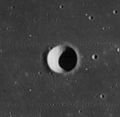Schiaparelli (lunar crater)
 Lunar Orbiter 4 image | |
| Coordinates | 23°24′N 58°48′W / 23.4°N 58.8°W |
|---|---|
| Diameter | 24 km |
| Depth | 2.1 km |
| Colongitude | 59° at sunrise |
| Eponym | Giovanni Schiaparelli |



Schiaparelli (/ˌskæpəˈrɛli, ˌʃæp-/ SKAP-ə-REL-ee, SHAP-,[1][2] US also /skiˌɑːp-/ skee-AHP-,[2][3] Italian: [skjapaˈrɛlli]) is a lunar impact crater located on the western part of the Oceanus Procellarum, to the west of the crater Herodotus. The rim is relatively sharp-edged and relatively free from impact wear. The inner walls have slumped to form a shelf around much of the sides. The interior floor is somewhat irregular, but free from impacts of note.
This crater lies in a relatively flat and featureless part of the mare, although a ray streak from the distant crater Glushko passes along the southeastern edge of the rim, making it easy to identify. A low wrinkle ridge runs from the north rim of the crater to the north. Within the crater is a low central rise.
Satellite craters
[edit]By convention these features are identified on lunar maps by placing the letter on the side of the crater midpoint that is closest to Schiaparelli.
| Schiaparelli | Latitude | Longitude | Diameter |
|---|---|---|---|
| A | 23.0° N | 62.0° W | 7 km |
| C | 25.8° N | 62.2° W | 6 km |
| E | 27.1° N | 62.0° W | 5 km |
The following craters have been renamed by the IAU.
- Schiaparelli B — See Zinner (crater).
- Schiaparelli D — See Golgi (crater).
-
Lunar Orbiter 4 image of Schiaparelli A
-
Lunar Orbiter 4 image of Zinner (Schiaparelli B)
-
Lunar Orbiter 4 image of Schiaparelli C
-
Lunar Orbiter 4 image of Golgi (Schiaparelli D)
-
Lunar Orbiter 4 image of Schiaparelli E
References
[edit]- ^ "Schiaparelli, Giovanni Virginio". Lexico UK English Dictionary. Oxford University Press.[dead link]
- ^ a b "Schiaparelli". The American Heritage Dictionary of the English Language (5th ed.). HarperCollins. Retrieved 5 August 2019.
- ^ "Schiaparelli". Merriam-Webster.com Dictionary. Merriam-Webster. Retrieved 5 August 2019.
- Andersson, L. E.; Whitaker, E. A. (1982). NASA Catalogue of Lunar Nomenclature. NASA RP-1097.
- Blue, Jennifer (July 25, 2007). "Gazetteer of Planetary Nomenclature". USGS. Retrieved 2007-08-05.
- Bussey, B.; Spudis, P. (2004). The Clementine Atlas of the Moon. New York: Cambridge University Press. ISBN 978-0-521-81528-4.
- Cocks, Elijah E.; Cocks, Josiah C. (1995). Who's Who on the Moon: A Biographical Dictionary of Lunar Nomenclature. Tudor Publishers. ISBN 978-0-936389-27-1.
- McDowell, Jonathan (July 15, 2007). "Lunar Nomenclature". Jonathan's Space Report. Retrieved 2007-10-24.
- Menzel, D. H.; Minnaert, M.; Levin, B.; Dollfus, A.; Bell, B. (1971). "Report on Lunar Nomenclature by the Working Group of Commission 17 of the IAU". Space Science Reviews. 12 (2): 136–186. Bibcode:1971SSRv...12..136M. doi:10.1007/BF00171763. S2CID 122125855.
- Moore, Patrick (2001). On the Moon. Sterling Publishing Co. ISBN 978-0-304-35469-6.
- Price, Fred W. (1988). The Moon Observer's Handbook. Cambridge University Press. ISBN 978-0-521-33500-3.
- Rükl, Antonín (1990). Atlas of the Moon. Kalmbach Books. ISBN 978-0-913135-17-4.
- Webb, Rev. T. W. (1962). Celestial Objects for Common Telescopes (6th revised ed.). Dover. ISBN 978-0-486-20917-3.
- Whitaker, Ewen A. (1999). Mapping and Naming the Moon. Cambridge University Press. ISBN 978-0-521-62248-6.
- Wlasuk, Peter T. (2000). Observing the Moon. Springer. ISBN 978-1-85233-193-1.





